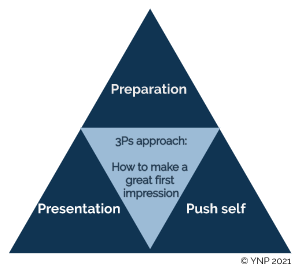We only get one chance to make a first impression. With our 3Ps of making a great first impression, you’ll learn how to make it memorable in all the right ways, especially with potential employers and colleagues.
What is a great first impression?
First impression is the opinion and mental image someone makes of you when you first encounter them, whether face to face or virtually. It is a two-way process but generally quick in nature. In some instances, such as job interviews and speed dating, people have been known to form opinions about others within the first few seconds or minutes of meeting them. In other instances the process can take slightly longer, for example an employer can use the first 100 days to form an opinion about the competency of a new employee.
Great first impressions are made when give others excellent reasons to be impressed by you. This article shows you how.

How objective are first impressions?
Unfortunately we do not always give a great first impression because of things like nerves and social anxiety. But, can we really say other people always judge us fairly during a first encounter? Certainly not. Even when we present ourselves impeccably, it is possible for some people to not be impressed by us. The reason being that forming first impressions is not always an objective process.
What then determines first impressions?
Quite often first impressions are influenced by numerous factors such as age, gender, race, language, voice, demeanor, education and cultural background, physical appearance, and so on. We can’t help that some people will have pre-conceptions about us or other people with certain traits and characteristics. Unfortunately this can make their opinion of us and others subjective and even biased – for example they may have the view that people of certain age or colour cannot be expected to do certain things. Such pre-conceptions should be challenged where they exist because they can lead to unconscious bias and discrimination of others.
Knowing then that some people may misjudge you at a first encounter might make you feel disheartened and hesitant to try to make a great impression. But the reality is that the majority of people have an open mind and will judge you fairly, if not generously. So, do what you can to improve the first impression you give. Here’s how…
The 3Ps of how to make a great first impression
- Prepare yourself to make a great first impression
- Present yourself effectively
- Push your boundaries to make a great first impression

1. Prepare yourself to make a great first impression
Preparation will make you more likely to give a great first impression. It can help calm any potential nerves and make you feel more confident at your first encounter. At times it may be possible to prepare, for example if you have been invited for a job interview or if a new client is interested in meeting to discuss a possible new contract. At other times, you will have to wing it, for example at impromptu first encounters.

Tips on how to prepare yourself
- Read up about the company. If your first encounter is a job interview or business related, finding out more about the company ahead of time is non-negotiable. And with most companies having an online presence these days, researching has never been easier. To help you make a great first impression, find out what you can about them – their culture, values, performance, etc. and use this information to tailor-make your pitch and physical appearance to what the company is all about.
- Get personal. If you know who you will be meeting, try to find out as much as you can about them. Again, most people will have an online presence these days. You may pleasantly find out from their online profile that you both went to the same school/university, share a love for dogs or support the same football team. But even if none of these apply, you could find some useful information you can use to smooth out your first encounter and make a great first impression. Be smart in how you use the information you find and be careful not to cyber-stalk.
- Brush up on your skills. This is super important ahead of business related encounters and job interviews. People are impressed by those who know their stuff. Spend time going over your resume ahead of an interview and for practical interviews such as cooking, singing or instrument playing, consider a few practice sessions, they will pay off. Consider preparing a portfolio of your relevant achievements too. For those approaching a new client, do practice your sales pitch. Also, do brush up on your emotional intelligence skills and be prepared to handle different personalities and situations effectively.
- Your outfit. What you wear at first encounters matters. Dress to impress if you want to make a great impression. However, consider dressing appropriately based on what you already know about the prospective job, company or client. For example if a company has a formal dress policy, avoid turning up in jeans. Preparing your outfit beforehand can save you a lot of stress on the day. It also helps you to avoid nasty surprises such as a missing button, a broken zip, ill-fitting clothes or a spot on your favourite tie. Remember your mental outfit too – wear the best attitude possible.
- Always stay prepped. If impromptu first encounters are a regular occurrence in your professional life, it might help to have at the ready an elevator pitch for when you need to make a great first impression at a moment’s notice.
2. Present yourself in a way that makes a great impression
Making a great first impression will require you to present yourself in the best way possible, both verbally and non-verbally. Flaunt your worth tactfully, there will be time for modesty later! Remember that the person/s you are encountering probably have an idea of who you are e.g. from your CV, online profile, introductory phone call etc. Unfortunately this means they may already have formed a rough opinion of you even before meeting you. Use this chance to correct any misconception and leave them with the right and best impression of you.

Tips on how to present yourself
- Smile. This is the best place to start when aiming to make a great first impression with new encounters. It gives an impression of confidence, warmth and invites people to trust you.
- Communicate effectively. Give the best sales pitch of yourself and don’t be afraid to use the information you have gathered. Aside from what you say, how you communicate is equally important when aiming to make a great first impression. For non-verbal communication check you are giving the right messages through your facial expression, body language, tone of voice, eye contact, etc. For verbal communication, listen actively and speak clearly, project your voice, mind your speech pace, answer questions with enough detail and without rumbling on, ask questions or for clarity if unclear, be assertive but respectful, sip some water if you feel nervous, and remember to breathe!
- Be confident and in control. Your posture tells a lot. So, aim to sit or stand in a way that shows confidence, be calm and in control of your emotions (nerves can destroy even the greatest content). Ensure your voice also demonstrates confidence and control.
- Be on time. When trying to make a great first impression, make whatever arrangements you need to in order to arrive on time. It shows you value yours and other people’s time. Use well the time you get given to answer questions or for presentation (try not rumble on or digress – much). Ask for more time if necessary, don’t just assume it is ok to run over.
3. Push your boundaries to make a great impression
To really impress and stand out from any competition you will need to push your boundaries to make a great first encounter. Do it consistently and tactfully. If you prepare and present yourself amazingly well, you may already be ahead. But a few more things can help you to push those boundaries and really impress at first encounters.

How to push your first impression boundaries
- Make great conversation. At interviews, a lot of people only tend to respond to questions. If you want to push those boundaries and leave a lasting impression, aim to have a conversation – an exchange of questions, answers and especially opinions. Make them good. Avoid small talk, it can be damaging at times like these.
- Be creative in illustrating your points. Again, having prior knowledge about the company and their culture will help you decide on what would be appropriate and impressive to them. For companies that are innovative and creative, consider creative illustrations of your ideas e.g. use of Lego for problem solving. For other more traditional companies, consider drawing graphics and diagrams to illustrate your thinking. These can be done on paper or virtually through tools such as Jamboards, Mural and others.
- Dare to differ or challenge, respectfully. Most people play it safe at interviews, too safe at times that they all kind of sound the same. Make a great impression by being unique and coming up with new ideas and perspectives. Where possible balance any big ideas with practical steps of how they can be achieved, otherwise you will run the risk of sounding like one who lives in the clouds.
- Address any recurring challenges in your first impression experiences. We are human and are bound to make mistakes. Do not expect to make perfect first impressions all the time. However, if you notice a pattern of bad first encounters, it may be time to look into why they keep happening and what you can do about it e.g. take courses to boost your confidence, communication, etc.
Which of these tips resonate with you and how you make great first impressions?

